Marathon mania
Updated: 2014-11-02 11:05
By Zheng Xin(China Daily)
|
||||||||
Fitness, fad and finance combine as participation skyrockets
In its 34th year, the Beijing International Marathon has drawn more than 60,000 hopeful participants in a registration period of only two weeks.
Yet the country's oldest race is capped at 30,000 runners, a number filled in less than 13 hours after registration opened last year.
So organizers have canceled the first-come, first-served policy to make sure more professional runners get the chance to hit the road.
"We have extended the registration period and cut participants to 30,000 based on their former achievements in marathon competitions, age, gender and nationalities," said Li Teng, publicity officer at China Olympic Road Running, one of the organizers of the race.
"The quota of 30,000 runners for the race was filled in 13 hours last year, compared to 180 hours in 2012 and one month in 2011," said Li.
"The registration period was also extended to make sure the website doesn't crash."
And Beijing is not alone.
'New cool'
The 2014 Guangzhou Marathon set for Nov 23 has already attracted some 50,000 applicants for its 20,000 slots, so whether they will run or not is determined by a lottery system.
The most senior hopeful is 83 years old, according to the Guangzhou sports authority.
Participating in marathon races has long been popular around the world, but it was only in recent years that the long-distance sport gained wide popularity in China. It has even become a fashion icon and the "new cool" for many Chinese.
According to Zhang Qing, founder of Key-Sports consulting agency, there will be 54 marathon races on the China's mainland this year. The figure in 2013 was around 36, triple that of 2010.
Low entry barrier
Roger Robinson, a former world-class runner, once said no other sport has lower entry barriers, describing running as the most accessible, cheapest and easily organized sport.
Zhang noted that "you don't need many facilities or much equipment - a pair of shoes and you go hit the road, young and old, women and guys".
The growing number of marathons nationwide is also due to the country's economic development and rapid expansion of a middle class that is more than ever keen on staying healthy and fit.
"After the GDP reaches a certain level, local people tend to have urges for moderate pleasures," said Zhang.
China now has up to 300 million people focused on healthy and fit lifestyles, most of them in highly developed cities like Beijing, Shanghai and Guangzhou, he said.
Another reason is the "halo effect" of a long-distance race - its impressive image, said Zhang.
"The hard-to-get ticket for the Beijing International Marathon has also made it more than popular," he noted.
Begun in 1981, the Beijing marathon was at first open to only professionals. Amateur runners began participating in 1998, with a half-marathon, 10-kilometer and mini-marathon held to involve more participants.
When the number of participants surged to 38,000 from a few hundred in 1999, the organizing committee started to charge entry fees in line with international practices.
Then as popularity skyrocketed, the committee dropped the mini-marathon popular with amateurs to make sure the race attracted world-class athletes and reached an international level.
Brand fave
The popularity has also attracted the attention of enterprises that want to promote their brands and products, sports related or not.
According to the sports brand Asics, which has sponsored the Beijing Mountain Marathon for two consecutive years, the competition is a great way to get feedback from runners about a product.
Li Yimei, marketing director of Beijing-based China Asset Management Co Ltd and a major sponsor of the Beijing International Marathon this year, said she is impressed by the rapid growth in long distance running in China.
And a large proportion of the expanding group of marathoners are from the country's exploding middle class, young and well-off.
"Most of the runners are our target clients who share the same ideas as us, be it permanent investment in health or assets," she said.
"It is believed sponsoring marathon races will bring us more publicity and closer contact with clients."
Li said the huge popularity of the sport means organizers are in turn looking for more than just sponsorship.
"We have to choose the brands and companies that have a shared value with the sport," he said.
Many businesses and their leaders now even directly compete.
Property developer China Vanke Co, which has sponsored several marathons at home and abroad, is one of them.
Wang Shi, Vanke's board chairman, led 15 employees in the Boston Marathon last April.
City image
According to Zhang, most city marathons are hosted by local governments, even as far a field as Lanzhou in Gansu province, Lhasa in the Tibet autonomous region and Xinyuan county in the Xinjiang Uygur autonomous region.
Zhang said they are trying to grasp the chance to boost fitness while promoting local tourism.
Many cities set unique routes across local scenic spots and historical attractions, and many also invite celebrities to join in a bid to increase their influence.
In June, Pan Shiyi, a property tycoon and celebrity blogger, ran a half marathon in Lanzhou, Gansu, where he was born. It was the second time after he joined the race last year.
In September, Sa Beining, a well-known TV presenter, participated in the 16th Beijing Hope Run, a charity run in Beijing's Chaoyang Park for cancer patients and research.
Zhang said many local governments organize marathons to win glory and earn credit in assessment and evaluation indexes of people's health, happiness and well-being.
"The governments used to be evaluated based on their GDP, but the well-being and fitness of the people are just as important now, which prompts cities to come up with long distance races," said Zhang.
"More governments prefer to invest in physical exercise than medical insurance."
Zhang said it is easier for the government to host a marathon considering the need for traffic control and security.
"But as China's marathon races further develop, it is hoped more non-profit and non-governmental organizations can be involved," he said.
Another reason behind cities' enthusiasm for hosting marathon races is tourism promotion.
"As increasing numbers of people prefer to attend a marathon race in a different city, there comes the need for transportation, accommodation, food and sightseeing," he said.
"You travel all the way to Qinhuangdao for a marathon race and you definitely want to further explore the city after finishing the run."
Far from enough
Despite the surge in recent years, China holds far fewer marathons than some developed countries, which host hundreds each year, said Zhang. In fact, China has the fewest number of marathons among the top 10 economies in the world, he said.
The United States holds more than 200 marathon races each year, including the world-famous Boston Marathon. Japan also hosts more than a hundred annually, featuring various themes from the landscape marathon in Hokkaido to cultural routes in cities, he said.
Duan Shijie, vice-minister of the General Administration of Sport in China and president of the Chinese Athletic Association, noted that the market is "far from saturation".
Quality wanted
But amid the rapid growth, most marathon races in China are less than satisfying, said Zhang.
"Taking the Beijing International Marathon for instance - the lack of drinking water stations and toilets that once caused inconvenience for participants should not have happened at all," he said.
In addition, the marathons should also further consider the runners' needs and provide them with a place for parties or celebrations after finishing the epic journey.
"Some cities end the race in an open city park with exhibition booths and food stands around for runners to take a break while celebrating the moment with others, but some simply end in a narrow road with no scenery at all," he said.
It will still take time for organizers to come up with a thoroughbred race for Chinese runners, he said.
zhengxin@chinadaily.com.cn
|
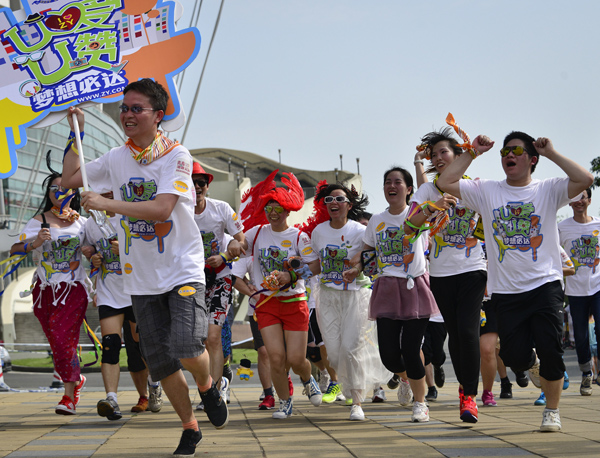 Participants in a race in Guangzhou, Guangdong province, in May. Gao Dianhua / For China Daily |

 Ontario officials seek business in China
Ontario officials seek business in China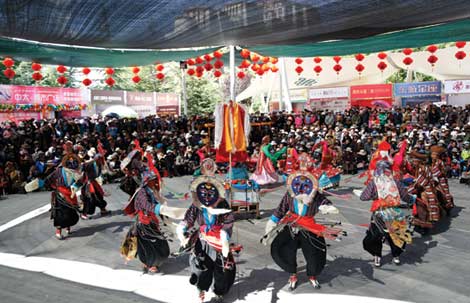
 Tibetan culture to display splendor in Canada
Tibetan culture to display splendor in Canada
 Run or dye - Color Run comes to Guangzhou
Run or dye - Color Run comes to Guangzhou
 Art Taipei 2014 draws international artists
Art Taipei 2014 draws international artists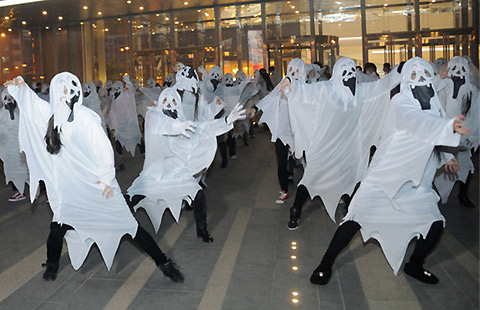
 Halloween fun in China
Halloween fun in China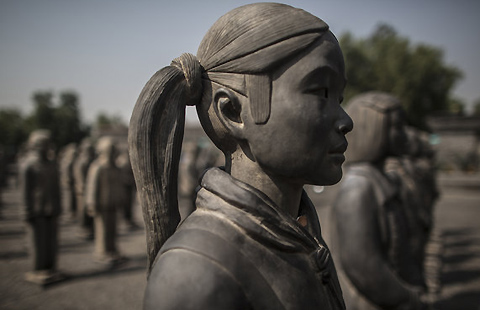
 'Terracotta Daughters' on display in Mexico
'Terracotta Daughters' on display in Mexico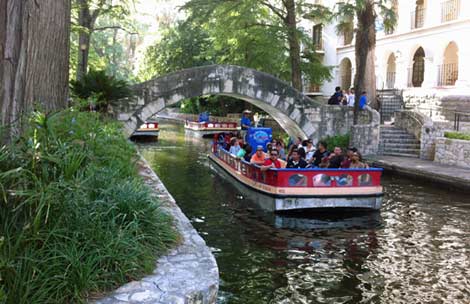
 Reclaiming a piece of history
Reclaiming a piece of history
 Across Americas over the week (Oct 24-30)
Across Americas over the week (Oct 24-30)
Most Viewed
Editor's Picks

|

|

|

|

|

|
Today's Top News
Xi urges serious reflection on Xu Caihou's case
Canada PM on trade mission in China
Police hunt for jail breaker in China
Alibaba: trading volume to exceed Walmart in 2-yr
China amends law to support citizens suing gov't
China Internet companies find Brazil attractive
China ratifies national Constitution Day
China passes Counterespionage Law
US Weekly

|

|







